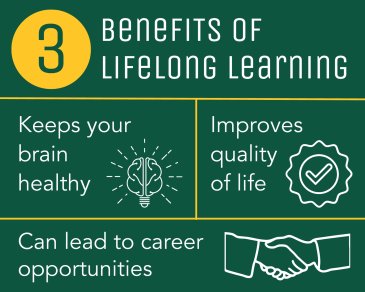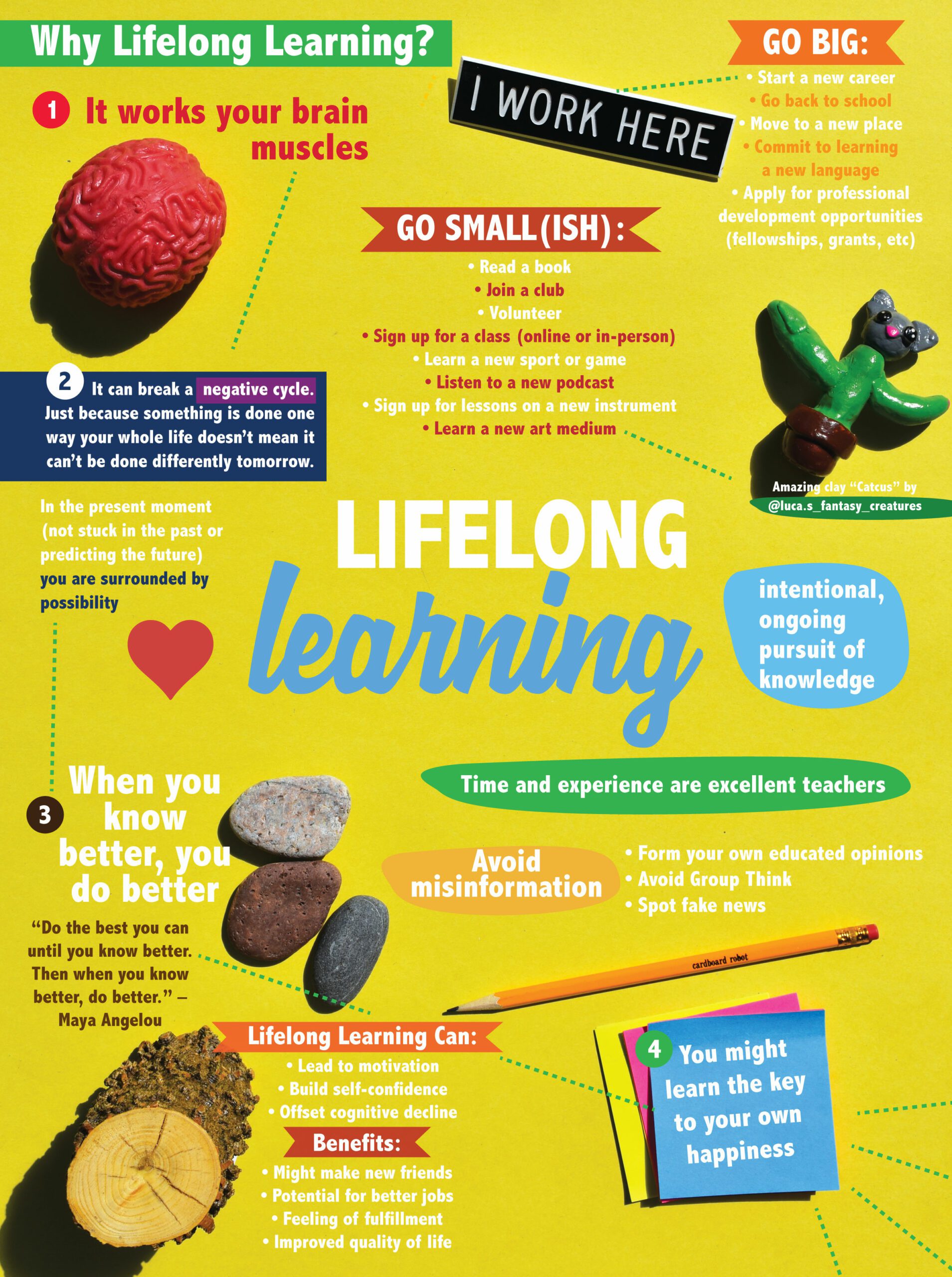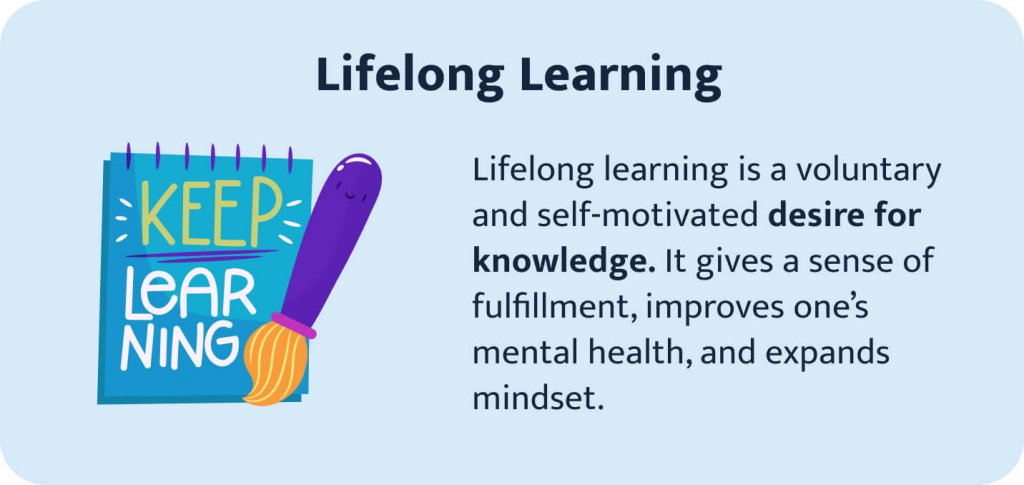Lifelong learning refers to the continuous pursuit of knowledge and skills throughout an individual’s life, beyond the boundaries of formal education. It encompasses a variety of activities, from professional training and online courses to personal hobbies and self-study. The importance of lifelong learning cannot be overstated, especially in today’s fast-paced world, where industries and job requirements evolve at an unprecedented rate. In the corporate landscape, employers increasingly value individuals who demonstrate a commitment to ongoing education, recognizing that it enhances job security and supports career growth. According to a survey, a staggering 87% of workers believe that learning throughout their careers is crucial. By embracing lifelong learning, professionals not only keep their skills up-to-date but also exhibit their adaptability and dedication to their fields.
Benefits for Personal Growth
Engaging in lifelong learning offers numerous benefits for personal growth:
- Boosted Self-Confidence: Mastering new skills can instill a sense of accomplishment and boost self-esteem.
- Enhanced Motivation: Learning something new can reignite passion and enthusiasm in both career and personal life.
- Improved Cognitive Abilities: Regularly challenging oneself leads to better memory, critical thinking skills, and reasoning abilities.
- Expanded Horizons: Exploring diverse subjects or hobbies can lead to new interests, making life more fulfilling.
For instance, consider someone who takes up painting in their spare time. Not only does this hobby enhance their creativity, but it also provides a refreshing break from their daily routine, contributing to overall happiness and satisfaction. Lifelong learning creates opportunities for individuals to continually reinvent themselves, both personally and professionally.

Lifelong Learning vs Traditional Education
Differences in Approach
While both lifelong learning and traditional education aim to foster knowledge and skills, their approaches are fundamentally different. Traditional education is structured, often involving formal settings like schools or universities, with defined curricula, grades, and guidelines. Conversely, lifelong learning is inherently self-directed and voluntary. Individuals engage in it for personal or professional growth, driven by their interests and needs rather than institutional requirements. Consider someone who decides to learn photography through online tutorials. This learner is pursuing knowledge based on passion, without the pressures of formal assessments. Key differences include:
- Flexibility: Lifelong learning allows individuals to learn at their own pace, while traditional settings follow a fixed schedule.
- Relevance: Lifelong learners can tailor their studies to immediate personal interests or job requirements.
- Learning Environment: Traditional education typically occurs in classrooms, while lifelong learning can take place anywhere—be it at home, during travel, or in community workshops.
Complementary Relationship
Despite their differences, lifelong learning and traditional education complement each other effectively. Traditional education lays a foundational knowledge base, while lifelong learning builds upon and expands that foundation. For instance, a nurse may complete a degree to gain essential medical knowledge but will engage in lifelong learning through attending workshops and pursuing certifications to stay current with evolving medical practices and technologies. This synergy enhances overall competency and adaptability. By recognizing the strengths of both methods, individuals can take charge of their education, leading to enriched personal and professional outcomes. Embracing lifelong learning does not negate the value of traditional education; instead, it enriches it, creating a well-rounded learner ready to tackle an ever-evolving world.

Lifelong Learning for Professional Development
Advancing Your Career
Lifelong learning is a game changer when it comes to advancing your career. In today’s rapidly evolving job market, the ability to adapt and grow is essential. As professionals embrace continuous development, they position themselves as invaluable assets to their organizations. For example, consider a marketing professional who takes online courses on data analytics. This new skill not only enhances their capability but also makes them more competitive for promotions and raises. Key benefits of lifelong learning for career advancement include:
- Better Adaptability: Lifelong learners can quickly adjust to workplace changes, whether due to new technology or market trends.
- Increased Job Security: By consistently updating skills, employees enhance their value and reduce the risk of obsolescence.
- Higher Earning Potential: Engaging in ongoing education can lead to promotions and pay raises. Studies suggest that professionals who continually learn tend to earn up to 10-15% more than those who don’t.
Acquiring New Skills
Acquiring new skills is at the heart of lifelong learning and is crucial for personal growth and career success. The process of learning does not end after obtaining a degree; it transforms into a constant quest for knowledge. This could mean learning new software, mastering a second language, or developing leadership skills. Here’s how to effectively integrate new skills into your professional journey:
- Set Clear Goals: Clearly define your learning objectives. For instance, if you want to become proficient in project management, identify the courses or certifications you’ll pursue.
- Leverage Online Resources: Websites like Coursera and LinkedIn Learning provide a plethora of courses that fit various professional needs, making it easier to learn on your own schedule.
- Network with Experts: Engage in discussions with industry professionals. Their insights can provide direction on which skills are most valuable in your field.
By committing to lifelong learning and skill acquisition, you empower yourself to seize new opportunities and navigate your career with confidence.

Lifelong Learning for Mental Health
Cognitive Benefits
Lifelong learning plays a crucial role in enhancing cognitive abilities, which is vital for maintaining mental health. Engaging in new learning experiences stimulates the brain, promoting better cognitive function and overall mental well-being. For example, someone who takes up learning a new language or musical instrument isn’t just picking up a new skill; they are also enhancing their memory, problem-solving abilities, and even their creativity. Here are some of the cognitive benefits associated with lifelong learning:
- Improved Memory: The process of learning new information helps strengthen neural connections, which can enhance memory retention.
- Better Critical Thinking: Engaging with diverse topics encourages critical thinking, enabling individuals to analyze and evaluate information more effectively.
- Greater Attention Span: Regular learning activities can improve focus and concentration, essential skills in today’s distraction-filled environment.
Reducing Cognitive Decline
One of the most significant benefits of lifelong learning is its potential to reduce cognitive decline as people age. Studies show that individuals who actively pursue learning opportunities tend to experience a slower rate of cognitive decline compared to their peers. To illustrate, consider a retired individual who decides to volunteer in community education programs. By teaching skills or sharing knowledge, they not only help others but also keep their minds engaged and sharp. Key strategies for leveraging lifelong learning to combat cognitive decline include:
- Participating in Workshops: Engaging in workshops or classes provides both social interaction and mental stimulation.
- Learning New Hobbies: Taking up hobbies that require skill development, such as gardening or crafting, promotes brain activity.
- Online Courses: Numerous platforms offer courses tailored to various interests, making it easier to learn at one’s own pace.
By integrating lifelong learning into daily life, individuals can enhance their cognitive functions and protect their mental health well into their later years.

Lifelong Learning for Social Engagement
Building Connections
Lifelong learning serves as a powerful tool for building connections and fostering social engagement. By participating in workshops, classes, or community education programs, individuals naturally expand their social networks. For instance, someone who enrolls in a local cooking class not only learns a new recipe but might also forge friendships with fellow cooking enthusiasts. Research suggests that engaging in lifelong learning increases interaction levels, which directly correlates with improved overall health and happiness. Here are a few ways lifelong learning enhances social connections:
- Networking Opportunities: Attending courses or seminars opens doors to meet like-minded individuals, leading to professional connections and friendships.
- Group Learning Dynamics: Collaborative projects encourage teamwork, helping participants hone their interpersonal skills.
- Shared Interests: Pursuing activities driven by passion, such as art or music, allows people to bond over common interests.
Improving Social Skills
Participating in lifelong learning activities also plays a crucial role in enhancing social skills. Whether it’s engaging in classroom discussions or collaborating on group projects, individuals sharpen their communication and interpersonal skills throughout the learning process. Benefits of improved social skills include:
- Increased Confidence: Learning in a group setting can ease social anxiety, helping individuals feel more at ease in social interactions.
- Active Listening: Lifelong learners often develop stronger active listening skills, enhancing their ability to engage in meaningful conversations with others.
- Empathy Development: Exposure to various perspectives during learning can foster empathy, making individuals more understanding and relatable.
By embracing lifelong learning, individuals not only acquire new knowledge but also cultivate vital social skills that enrich their lives and communities. As they connect with others, they create a supportive network that adds depth and fulfillment to their personal and professional journeys.
